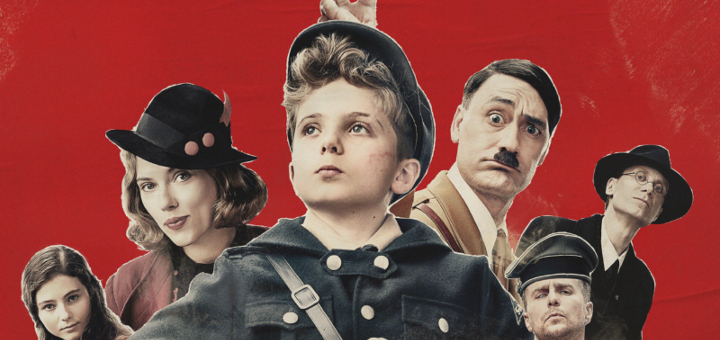
 Photo by Kimberley French. © 2019 Twentieth Century Fox Film Corporation All Rights Reserved.[/caption]
When I first saw the trailer of this film I questioned whether it would be an offensive treatment of such a terrifying historical event as is the Holocaust. Looking at the tragedy of World War II through the eyes of a young German boy initiated into the Nazi Party is both horrifying as well as heart rending as we glimpse his innocence and his desperate desire to belong. His world changes when he comes into contact with a Jewish girl and develops a somewhat reluctant but needed friendship with her.
The young British actor, Roman Griffin Davis, brilliantly portrays the character Johannes “Jojo” Betzler, who lives alone with his mother Rosie (Scarlett Johansson) since his father went off to war and his older sister Inge died recently of influenza. This quirky comedy-drama written and directed by New Zealander Taika Waititi is based on the book Caging Skies by Christine Leunens. Waititi plays Jojo’s imaginary friend in the story, a fantasized impersonation of Adolf Hitler, bringing the comedy element to life in the film. Their imaginary conversations are what keep Jojo following the party line that has been fed to him at the Nazi youth camps.
Jojo and his adorable friend Yorki (Archie Yates) attend a camp run by the unkempt and unconventional Captian Klenzendorf (Sam Rockwell). Jojo is challenged to face his fear by killing a rabbit. When he would not, the other kids started calling him “Jojo rabbit” making him run off in tears. After a determined conversation with the imaginary Adolf, he runs back into camp picking up a grenade throwing it ahead of him. It bounces off a tree truck and lands at his feet exploding in front of him causing Jojo to have facial scars and a permanent limp. Because of the incident Klenzendorf is demoted and Rosie asks him to employ Jojo with some war task. So Jojo wanders around town collecting scrap metal for the war effort, when later he discovers his mother leaving anti-Nazi leaflets around town. He returns home and discovers his mother is hiding a teenage Jewish girl names Elsa in the attic. He interrogates Elsa about all that he heard about Jews from the Nazi propaganda. She teases him by making up more stories about Jewish powers. She says that she has a boyfriend named Nathan who is involved in the war and she has not heard from him. Jojo pretends to be Nathan and writes a letter to Elsa saying he wants to break up with her. Jojo’s innocence comes to the fore when his empathy for her is ignited after she begins to cry. He quickly forges another letter saying he changed his mind. A lovely, sweet friendship is ignited. Jojo begins to see Elsa as just another human being with feelings, desires, hopes, and dreams, just like him.
Photo by Kimberley French. © 2019 Twentieth Century Fox Film Corporation All Rights Reserved.[/caption]
When I first saw the trailer of this film I questioned whether it would be an offensive treatment of such a terrifying historical event as is the Holocaust. Looking at the tragedy of World War II through the eyes of a young German boy initiated into the Nazi Party is both horrifying as well as heart rending as we glimpse his innocence and his desperate desire to belong. His world changes when he comes into contact with a Jewish girl and develops a somewhat reluctant but needed friendship with her.
The young British actor, Roman Griffin Davis, brilliantly portrays the character Johannes “Jojo” Betzler, who lives alone with his mother Rosie (Scarlett Johansson) since his father went off to war and his older sister Inge died recently of influenza. This quirky comedy-drama written and directed by New Zealander Taika Waititi is based on the book Caging Skies by Christine Leunens. Waititi plays Jojo’s imaginary friend in the story, a fantasized impersonation of Adolf Hitler, bringing the comedy element to life in the film. Their imaginary conversations are what keep Jojo following the party line that has been fed to him at the Nazi youth camps.
Jojo and his adorable friend Yorki (Archie Yates) attend a camp run by the unkempt and unconventional Captian Klenzendorf (Sam Rockwell). Jojo is challenged to face his fear by killing a rabbit. When he would not, the other kids started calling him “Jojo rabbit” making him run off in tears. After a determined conversation with the imaginary Adolf, he runs back into camp picking up a grenade throwing it ahead of him. It bounces off a tree truck and lands at his feet exploding in front of him causing Jojo to have facial scars and a permanent limp. Because of the incident Klenzendorf is demoted and Rosie asks him to employ Jojo with some war task. So Jojo wanders around town collecting scrap metal for the war effort, when later he discovers his mother leaving anti-Nazi leaflets around town. He returns home and discovers his mother is hiding a teenage Jewish girl names Elsa in the attic. He interrogates Elsa about all that he heard about Jews from the Nazi propaganda. She teases him by making up more stories about Jewish powers. She says that she has a boyfriend named Nathan who is involved in the war and she has not heard from him. Jojo pretends to be Nathan and writes a letter to Elsa saying he wants to break up with her. Jojo’s innocence comes to the fore when his empathy for her is ignited after she begins to cry. He quickly forges another letter saying he changed his mind. A lovely, sweet friendship is ignited. Jojo begins to see Elsa as just another human being with feelings, desires, hopes, and dreams, just like him.
 Photo by Kimberley French. © 2019 Twentieth Century Fox Film Corporation All Rights Reserved.[/caption]
Through moments of tragedy they are there for one another even to the end of the war. When the Gestapo come to search the house, Elsa dresses as Inge and even produces Inge’s papers after having memorized her personal information. When questioned by Captain Klenzendorf who is present with the Gestapo Elsa gives Inge’s birthday only to discover later that she gave the wrong information. Klenzendorf went along with it. Jojo and Elsa comfort one another in a world where the innocent are preyed upon and resistance bears ultimate consequences.
Yorki, a child soldier, honestly tells Jojo that the Russians and Americans are winning the war and that he honestly does not know what they are all fighting for anyway. Sometimes it’s just easier to follow the crowd, to get caught up in the emotions of being on top, being in control. Yet, when we really connect on a human level with our enemy are we really that different? Jojo discovers that he has been told lies about Jews, and that everything that his imaginary friend Adolf has been telling him is false, and that his parents are the true heroes resisting the Nazi propaganda.
Photo by Kimberley French. © 2019 Twentieth Century Fox Film Corporation All Rights Reserved.[/caption]
Through moments of tragedy they are there for one another even to the end of the war. When the Gestapo come to search the house, Elsa dresses as Inge and even produces Inge’s papers after having memorized her personal information. When questioned by Captain Klenzendorf who is present with the Gestapo Elsa gives Inge’s birthday only to discover later that she gave the wrong information. Klenzendorf went along with it. Jojo and Elsa comfort one another in a world where the innocent are preyed upon and resistance bears ultimate consequences.
Yorki, a child soldier, honestly tells Jojo that the Russians and Americans are winning the war and that he honestly does not know what they are all fighting for anyway. Sometimes it’s just easier to follow the crowd, to get caught up in the emotions of being on top, being in control. Yet, when we really connect on a human level with our enemy are we really that different? Jojo discovers that he has been told lies about Jews, and that everything that his imaginary friend Adolf has been telling him is false, and that his parents are the true heroes resisting the Nazi propaganda.
 Photo by Kimberley French. © 2019 Twentieth Century Fox Film Corporation All Rights Reserved.[/caption]
This film, though from all appearances is offensive by making a joke of Nazis, is actually a telling film about deep, authentic encounter with the other. When we understand the other person and hear their stories, their concerns, their fears, we then can connect with them on a deeply human level, since we too have our own desires and stories to convey. We all, in the end, just want to be known by another. We desire communion that leads to understanding, empathy that leads to friendship. How many more wars could be avoided if we just did what Jojo did and stopped to listen to the other. This lovely, yet challenging film can call us all to question our motivations and offer the mature response of selfless love.
https://youtu.be/tL4McUzXfFI
Photo by Kimberley French. © 2019 Twentieth Century Fox Film Corporation All Rights Reserved.[/caption]
This film, though from all appearances is offensive by making a joke of Nazis, is actually a telling film about deep, authentic encounter with the other. When we understand the other person and hear their stories, their concerns, their fears, we then can connect with them on a deeply human level, since we too have our own desires and stories to convey. We all, in the end, just want to be known by another. We desire communion that leads to understanding, empathy that leads to friendship. How many more wars could be avoided if we just did what Jojo did and stopped to listen to the other. This lovely, yet challenging film can call us all to question our motivations and offer the mature response of selfless love.
https://youtu.be/tL4McUzXfFI
Copyright 2020 Sr. Nancy Usselmann, FSP First published on BeMediaMindful.org
About the Author

Sister Nancy Usselmann, fsp
Sr. Nancy Usselmann, FSP is a Daughter of St Paul and the Director of the Pauline Center for Media Studies in Los Angeles, CA. She is a Media Literacy Education Specialist, theologian, international speaker, film reviewer, and blogger for BeMediaMindful.org. Her book A Sacred Look: Becoming Cultural Mystics is a theology of popular culture published by Wipf & Stock Publishing.


.png?width=1806&height=731&name=CatholicMom_hcfm_logo1_pos_871c_2728c%20(002).png)
Comments